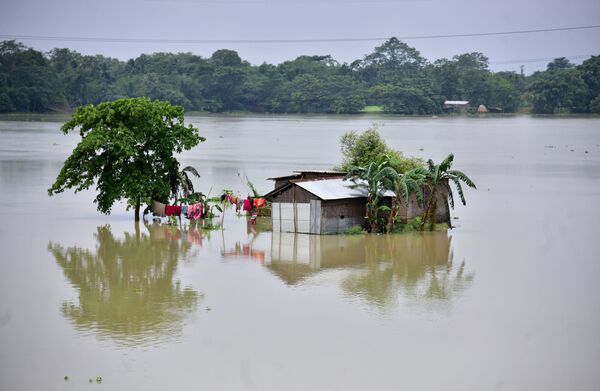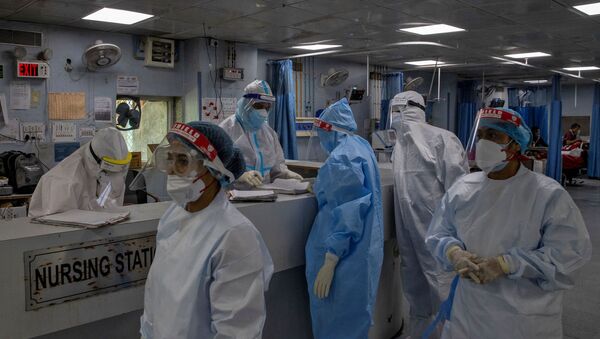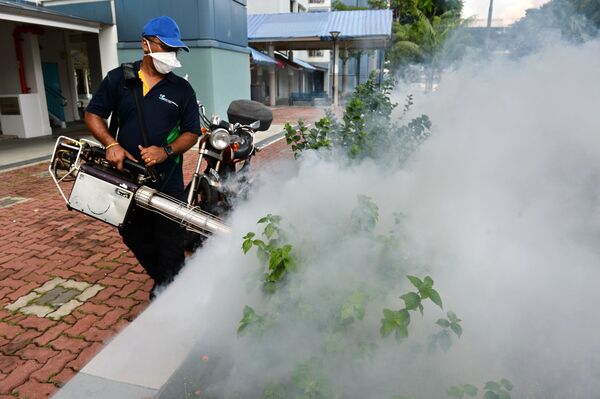As mosquito-borne diseases jump sharply with the onset of the monsoon season, virologists are warning the government to immediately come up with a clear clinical protocol to avoid the intermingling of those infected with COVID-19.
India’s two most pandemic-infested cities - Delhi and Mumbai - have recorded over 1300 cases so far this season.
In India, mosquito-borne diseases are traditionally a major cause of concern, with the south Asian country reporting 136,422 cases of dengue fever in 2019.
“The vector-borne diseases will bring more problems for India, mounting pressure on healthcare facilities. I feel that COVID-19 will create a lot of confusion, as all can present with a high fever. Therefore, a clear clinical protocol is needed to deal with someone who shows up at a hospital with a fever,” virologist Shahid Jameel told Sputnik.
Implications When Endemic Collides With Pandemic
Experts say the dengue fever and malaria are both endemic to India and linger in an area for a longer period of time once the area becomes contaminated.
“Rain and dengue is a combination. Once an area becomes endemic for dengue it remains for quite some time, as mosquitoes keep the virus alive for some time, to transmit it to the younger generation of mosquitoes. It’s a chronic problem we will have that is spreading anyway,” Jayaprakash Muliyil, chairman of the scientific advisory committee of the National Institute of Epidemiology in India, told Sputnik.
“I think in suspected cases of vector-borne diseases, first the person should be tested for malaria, dengue and chikungunya. Those negative may then be tested for COVID-19,” said Jameel.
The chances of a person catching COVID-19 and malaria or dengue at the same time are low, but the possibility cannot be ruled out.
“There are no reports I am aware of how COVID-19 will behave in presence of another viral infection or malaria, as of now,” he added.
Dengue Measures Gone for Toss
Pre-monsoon measures to prevent the disease through public awareness campaigns, widespread fumigation and door-to-door surveillance measures have been hampered due to the pandemic lockdown, as COVID-19 cases rapidly increase.
The rate at which the coronavirus infection is spreading is far higher than the two worst-hit countries – US and Brazil. India is trailing by 1.6 million cases, currently number three in the world.
“I have not seen any action on the ground to control the spread of dengue. The main problem will be that people [ill] with dengue fever will have to undergo a check for COVID-19. In villages that would be a problem,” said Muliyil.
Officials at the Municipal Corporation of Delhi (MCD), a civic body responsible for sanitation and development work, told Sputnik that due to COVID-19, dengue fever response measures have been reduced by half in the city. Every year thousands of workers formerly undertook the task of fumigation and surveillance. With restricted lockdown movement, however, those normal efforts have been curtailed.
Indian Prime Minister Narendra Modi recently inaugurated “state-of-the-art COVID-19 testing facilities” which will be equipped with facilities for diagnosing other diseases, including Hepatitis B and C, HIV and dengue fever.
The MCD official stated, on condition of anonymity, however, that several dengue fever cases have not been registered due to the coronavirus pandemic.
“Either people are getting self-treated at home or getting mixed up with COVID-19 due to overlapping symptoms,” the official suggested.
Ongoing floods in the Indian states of Assam and Bihar are expected to worsen the situation, experts agree.

Currently, 5.7 million people have been affected by the flooding, with over 42,000 housed in 236 makeshift camps. COVID-19 hospitals are also flooded as waterlogged streets hamper movement in the affected areas both for the ill and medical professionals.
A joint director of the National Vector Borne Disease Control Programme, Dr. Girimallappa N. Nesaragi, admitted that awareness drives on the prevention of dengue fever were not being conducted, due to the pandemic. Health care officials are focusing instead on spreading the message through social media, targeting high-risk zones in Bangaluru.
Distinguishing Between Dengue FEVER & Covid-19
Like COVID-19, people infected with dengue can be asymptomatic. The possibility of misdiagnosing a COVID-19 patient as suffering from dengue fever, and vice-versa, is high, as both diseases present similar symptoms in the early stages.
According to WHO, severe headache, fever, muscle and joint pains nausea, vomiting, rashes and muscle and joint pains are symptoms of dengue fever, overlapping some common COVID-19 symptoms of fever, aches and pains, headache, and rash on skin, among others.
Virologist Jameel states that the only way to accurately distinguish between the two is through diagnostic testing.




